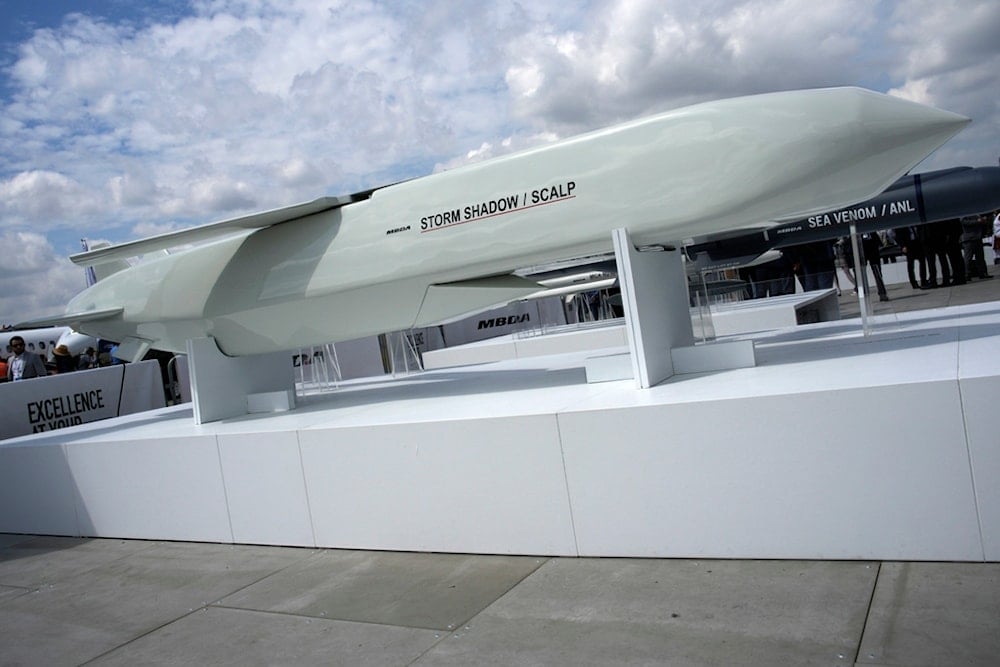UK to supply Storm Shadow missiles to Ukraine for strikes on Russia
The announcement marks a significant escalation in Western military aid to Kiev, as discussions about the future direction of the conflict intensify under Trump's incoming leadership.
-

The Storm Shadow cruise missile is on display during the Paris Air Show in Le Bourget, north of Paris, France, on June 19, 2023. (AP)
The United Kingdom is expected to greenlight the use of Storm Shadow long-range missiles by Ukraine to strike targets inside Russia, following a similar decision by US President Joe Biden to approve the use of ATACMS missiles, The Guardian reported on Tuesday.
The announcement marks a significant escalation in Western military aid to Kiev, as discussions about the future direction of the conflict intensify under Trump's incoming leadership.
Speaking at the G20 summit in Rio de Janeiro, British Prime Minister Keir Starmer reiterated the UK's commitment to Ukraine, stressing the need to "double down" on military support, though he did disclose operational details.
"I've been really clear for a long time now: we need to make sure Ukraine has what is necessary for as long as necessary because we cannot allow Putin to win this war," Starmer said.
Read more: What are the implications of allowing Ukraine to strike inside Russia?
The decision to provide long-range missiles has drawn sharp condemnation from Russia, with Kremlin spokesperson Dmitry Peskov accusing the US and its allies of escalating the conflict.
Peskov reiterated Russian President Vladimir Putin's warning that allowing Kiev to strike Russian territory would amount to NATO being "directly at war" with Moscow. Russian officials hinted at potential reciprocal actions, raising fears of further destabilization.
Divisions Among European Allies
While the US and UK are taking a firmer stance, European allies remain divided. France's Foreign Minister Jean-Noël Barrot said Paris was open to allowing the use of its Storm Shadow missiles to target Russian positions if it would help Ukraine defend itself.
German Foreign Minister Annalena Baerbock called Biden's decision "essential," but Berlin has maintained its refusal to supply Taurus long-range missiles, a decision that has stirred controversy within Germany.
Hungary, seen as one of Russia's closest EU allies, criticized the move. Hungarian Foreign Minister Péter Szijjártó labeled it a "desperate attack" by pro-war leaders unwilling to recognize the recent victory of Donald Trump, warning of the risks of escalating the conflict further.
Political Uncertainty
The Biden administration's decision has also faced criticism at home, particularly from figures aligned with incoming President-elect Donald Trump.
Donald Trump accused the military-industrial complex of pushing the world toward "World War Three" for profit, while Elon Musk, a Trump ally, warned of reciprocal actions from Russia.
Read more: Trump allies say Biden trying to ignite WWIII over ATACMS decision
Russian lawmakers expressed hopes that the Trump administration, once in office, would reverse Biden's decision. Russian official Maria Butina accused the outgoing administration of escalating tensions to the maximum while still in power.
The Kremlin has, however, downplayed the significance of Trump's victory, suggesting it is unlikely to substantially improve the strained US-Russia relations.
Ukraine has long lobbied for access to long-range missile systems to strike deep into Russian territory, targeting key logistical hubs, airbases, and supply depots. The expected UK decision to join the US in supporting these efforts comes amid growing frustration in Kiev over delays in Western aid.
On Monday, Polish Defense Minister Wladyslaw Kosiniak-Kamysz voiced criticism over the timing of the US decision to allow Ukraine to use long-range missiles.
Speaking to reporters, Kosiniak-Kamysz said the delay has raised widespread questions. "I do not think this will be a turning point. It would have a much stronger effect if the decision had been made earlier," he remarked.

 4 Min Read
4 Min Read









